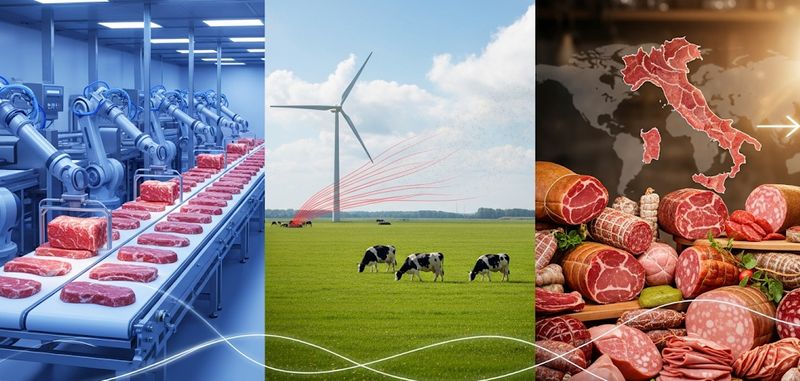
Market Pulse: Tönnies Invests, Dutch Stick to Nitrogen Goals, and Italian Exports Boom
German giant Tönnies invests in automation, Dutch farmers face ongoing nitrogen policy pressure, and Italian PDO/PGI cured meat exports show remarkable growth.
Corporate Strategy: Germany's Tönnies Invests €100m in Automation
What happened: German meat processing giant Tönnies has announced a €100 million investment in automation and digitalisation across its facilities. The company stated the investment is a direct response to ongoing labour shortages and is aimed at improving efficiency, enhancing workplace ergonomics, and ensuring long-term competitiveness. The new systems will focus on automating repetitive tasks in deboning, packaging, and internal logistics.
Why it matters: This is a major strategic move by one of Europe's largest processors to future-proof its operations. It signals a clear industry trend away from reliance on manual labour towards a more technologically advanced production model. For a company of Tönnies' scale, this level of investment will set a new benchmark for efficiency and will put pressure on competitors to follow suit.
Implications & suggested actions:
Processors: Tönnies' investment underscores the urgency of developing a long-term automation strategy. Begin by identifying the most labour-intensive bottlenecks in your own operations and research scalable technological solutions.
Farmers & Suppliers: A more efficient and resilient Tönnies is a more stable customer. This investment should ensure the company can maintain high throughput and consistent demand for livestock.
Equipment Suppliers: This is a significant sales opportunity. Engage with Tönnies and other large processors to demonstrate how your automation and robotics solutions can address their specific challenges around labour and efficiency.
EU Regulation: Dutch Government Holds Firm on Nitrogen Targets
What happened: The Dutch government has confirmed it will push ahead with its policy to halve nitrogen emissions by 2035, despite ongoing protests from the farming community. The policy, which is driven by EU environmental regulations and a series of court rulings, continues to put significant pressure on the country's intensive livestock sector. The government's plan includes a multi-billion-euro fund for voluntary buyouts of farms near sensitive nature areas and investment in cleaner technologies.
Why it matters: The Netherlands is ground zero for Europe's nitrogen crisis, and the government's unwavering stance shows the immense regulatory pressure the industry is facing. The outcome will have long-term consequences for the size and structure of the Dutch meat and dairy sectors, which are major players in the EU market. The policy is likely to lead to a reduction in livestock numbers in one of Europe's most densely populated agricultural regions.
Implications & suggested actions:
Dutch Farmers: The pressure to adapt is immense. Engage with the government's transition schemes to understand the options available for buyouts, relocation, or investment in low-emission farming systems.
Processors & Wholesalers (EU-wide): A potential reduction in the Dutch herd could tighten the supply of pigs and cattle in the North-Western European market. Begin to strengthen your relationships with suppliers in other regions to mitigate this long-term risk.
Retailers: The Dutch situation is a clear example of how environmental policy can directly impact food supply chains. This reinforces the importance of promoting and supporting sustainable farming practices throughout your European sourcing network.
International Trade: Italian PDO/PGI Cured Meat Exports Surge
What happened: Several of Italy's most famous protected cured meat products are reporting a significant boom in exports for the first half of 2025. Mortadella Bologna PGI saw an 8.4% increase in overseas sales, while Salamini Italiani alla Cacciatora PDO reported a remarkable 24% jump in exports. The growth has been particularly strong in key EU markets like Germany, Belgium, and Spain, as well as in the UK and Switzerland.
Why it matters: This success story demonstrates the powerful and growing global consumer demand for products with strong provenance, quality, and a clear regional identity. The targeted, EU-funded promotional campaigns behind these products are clearly delivering a strong return on investment. It shows that even in a competitive market, a focus on premium, protected-status products can drive significant growth.
Implications & suggested actions:
Producers of PDO/PGI products: This is a clear validation of your strategy. Continue to invest in quality and coordinated marketing efforts to build on this momentum.
Processors & Exporters (non-PDO/PGI): The success of these protected products highlights a key market trend. Consider how you can better communicate the origin and quality story of your own products to tap into this consumer demand for authenticity.
Retailers & Importers: There is a clear and growing appetite for high-quality, geographically protected European meats. Give these products prominent placement and use in-store marketing to tell their story and educate consumers about what makes them unique.
Sources
Tönnies invests €100 million in automation to combat labour shortages - Lebensmittel Zeitung (15 August 2025)
Netherlands delays nitrogen emissions target, defying its own judges and the EU - POLITICO (25 April 2025)
Mortadella Bologna PGI: production (+3.2%) and sales (+3.4%) up in the first half of the year - Pubblicità Italia (5 August 2025)
Salamini Italiani alla Cacciatora PDO See Production and Exports Surge - Italianfood.net (30 July 2025)
